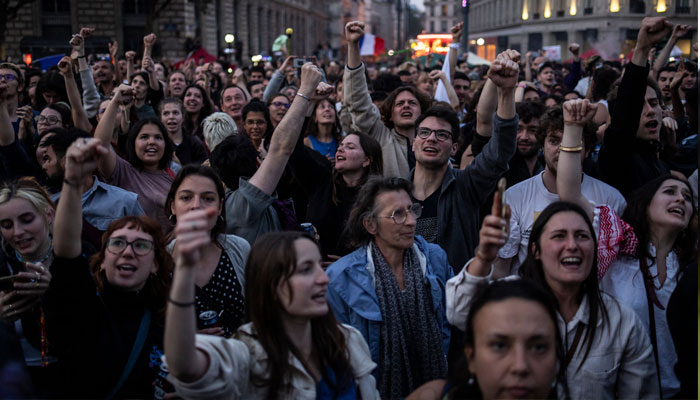France turns left
Man who called snap elections, French President Emmanuel Macron, and his party came in second place
The leftist New Popular Front coalition won the most seats in the 2024 French legislative elections, averting what many thought would be an opportunity for the far-right to take power in France. Several opinion polls had predicted that Marine Le Pen’s right-wing National Rally (RN) would end up with the victory in the second round of balloting but the party wound up in third place once the votes were tallied. The man who called these snap elections, French President Emmanuel Macron, and his party came in second place. Though a far-right sweep might have been avoided, France now faces the prospect of a hung parliament with no single bloc or coalition commanding a majority, all having widely different platforms and no tradition of working together. A centre-left coalition might seem like the most likely option, but there are major doubts over its potential cohesiveness. This will only add to the criticism directed towards Macron for calling for these elections in the first place. This decision was taken in the immediate aftermath of last month’s European Parliament elections in which Macron and his party and allies took a drubbing at the hands of the RN, exacerbating fears about Europe’s resurgent far-right.
Though the defeat of the RN might seem like the only positive to come out of these elections, it should not be undersold. The French left might just have come upon a formula that others in Europe can emulate to beat back the rising tide of chauvinism, virulent nationalism, racism and xenophobia that appears to be engulfing the continent from Italy and Germany to Ireland. The policies of the French New Popular Front also include a programme for economic relief via a cap on the prices of food, fuel and other essential goods. Their victory shows how popular and powerful pro-people economics can be when it comes to winning voter support. Indeed, more will be needed to defeat the far-right than to just remind voters about how terrible and scary they are. Concrete policies that help working people and ordinary households are vital.
Even more importantly, the RN’s setback shows how important it is not only for the left to work with each other but centrists as well. Historically, leftist coalitions have tended to be unsteady and prone to factionalism and infighting. The ongoing Middle East situation, rather than uniting the left has seen many more centrist-leftists turn on their erstwhile allies and try to purge them from the ballots and the party ranks. This latest French election ought to be a reminder to all ‘liberal’ centrists about the importance of working with the left as the latter is often the only thing keeping the far-right from the door. Many on the left have at times also tended to not work with liberal centrists even when it would appear to be the most sensible course of action. This is arguably something that has to change and the price for failing to do so may well be a far-right that is able to divide and conquer. Indeed, staying on the same page and managing disagreements and governing competently will be key to how the New Popular Front performs; that in turn will impact whether voters will be willing to back them in future elections.
-
 Super Bowl 2026 Live: Seahawks Lead Patriots 3-0 After Defensive First Quarter
Super Bowl 2026 Live: Seahawks Lead Patriots 3-0 After Defensive First Quarter -
 Bad Bunny's Super Bowl Halftime Show: What Time Will He Perform Tonight?
Bad Bunny's Super Bowl Halftime Show: What Time Will He Perform Tonight? -
 Where Is Super Bowl 2026 Taking Place? Everything To Know About The NFL Showdown
Where Is Super Bowl 2026 Taking Place? Everything To Know About The NFL Showdown -
 Drake 'turns Down' Chance To Hit Back At Kendrick Lamar At Super Bowl
Drake 'turns Down' Chance To Hit Back At Kendrick Lamar At Super Bowl -
 Sarah Ferguson Had A ‘psychosexual Network’ With Jeffrey Epstein
Sarah Ferguson Had A ‘psychosexual Network’ With Jeffrey Epstein -
 Czech Republic Supports Social Media Ban For Under-15
Czech Republic Supports Social Media Ban For Under-15 -
 Khloe Kardashian Shares How She And Her Sisters Handle Money Between Themselves
Khloe Kardashian Shares How She And Her Sisters Handle Money Between Themselves -
 Prince William Ready To End 'shielding' Of ‘disgraced’ Andrew Amid Epstein Scandal
Prince William Ready To End 'shielding' Of ‘disgraced’ Andrew Amid Epstein Scandal -
 Chris Hemsworth Hailed By Halle Berry For Sweet Gesture
Chris Hemsworth Hailed By Halle Berry For Sweet Gesture -
 Blac Chyna Reveals Her New Approach To Love, Healing After Recent Heartbreak
Blac Chyna Reveals Her New Approach To Love, Healing After Recent Heartbreak -
 Royal Family's Approach To Deal With Andrew Finally Revealed
Royal Family's Approach To Deal With Andrew Finally Revealed -
 Super Bowl Weekend Deals Blow To 'Melania' Documentary's Box Office
Super Bowl Weekend Deals Blow To 'Melania' Documentary's Box Office -
 Meghan Markle Shares Glitzy Clips From Fifteen Percent Pledge Gala
Meghan Markle Shares Glitzy Clips From Fifteen Percent Pledge Gala -
 Melissa Jon Hart Explains Rare Reason Behind Not Revisting Old Roles
Melissa Jon Hart Explains Rare Reason Behind Not Revisting Old Roles -
 Meghan Markle Eyeing On ‘Queen’ As Ultimate Goal
Meghan Markle Eyeing On ‘Queen’ As Ultimate Goal -
 Japan Elects Takaichi As First Woman Prime Minister After Sweeping Vote
Japan Elects Takaichi As First Woman Prime Minister After Sweeping Vote




